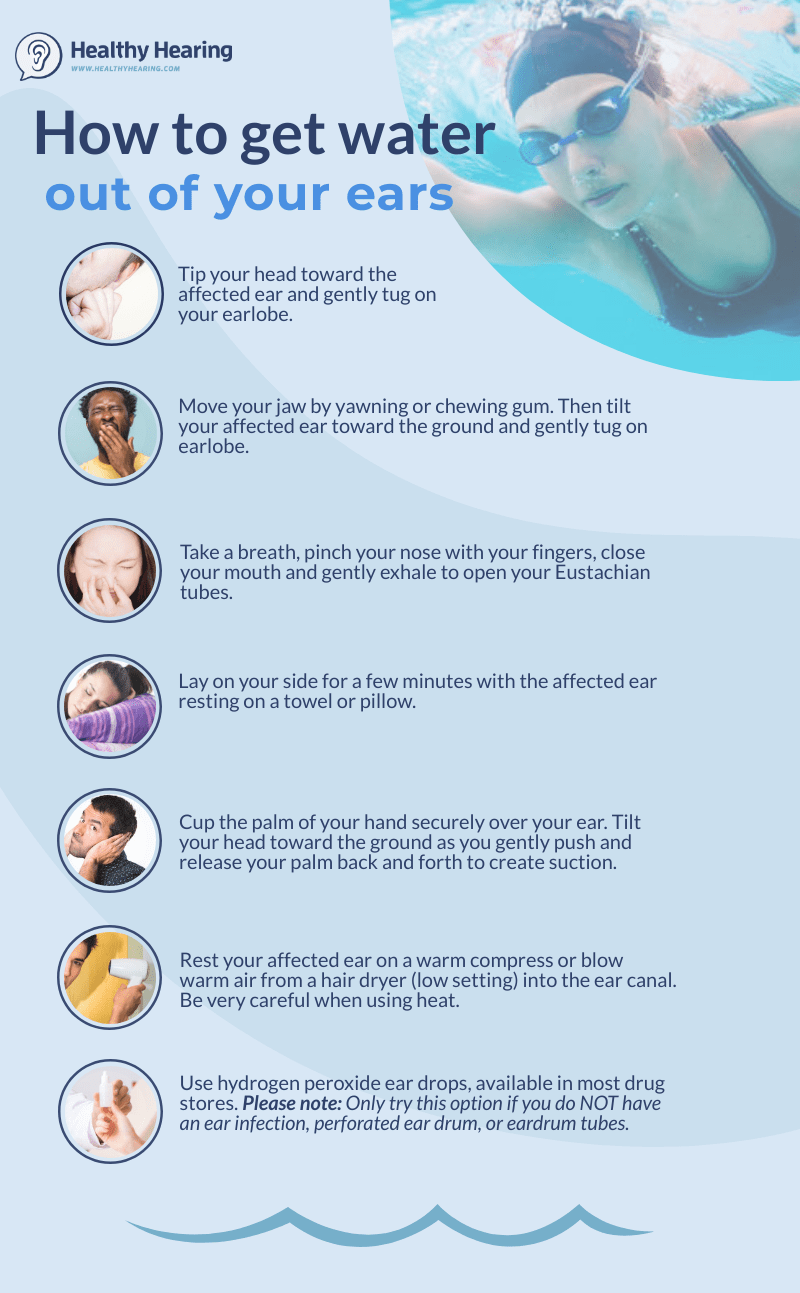Ever get water "stuck" in your ear canals? When this happens, you may hear and feel the water moving around, especially when you move your head. Your ear (or ears) may also feel extra stuffy, like you need to yawn. Fortunately, this is an easy situation to fix.

is all it takes to remove water in your ears.
How does water get stuck?
The shape of your ear canal combined with the pressure of the water can make you more likely to get water stuck in your ear, especially when you are fully submerged. Kids and adults who spend a lot of time in the water are most at risk; however, getting water stuck in your ears can happen anytime you go under the water.
Inverting yourself, like during a flip or handstand, is usually the fastest way this can happen.
People with small ear canals, extra earwax or a foreign object may be more like to experience this, too.
7 tips for getting water out of your ears

If you do happen to experience an episode of water in the ears, don’t insert anything solid inside your ear canal to help it drain. Using a cotton swab or other object—even your finger— may push obstructions deeper into the canal and puncture your eardrum. It can also scratch away the protective waxy layer inside your ear canal, providing an opening for bacteria to grow.
Instead, try these tips:
- Tip your head toward the affected ear and gently tug on your earlobe.
- Move your jaw by yawning or chewing gum. Then tilt your affected ear toward the ground.
- Take a breath, pinch your nose with your fingers, close your mouth and gently exhale to open your Eustachian tubes.
- Lay on your side for a few minutes with the affected ear resting on a soft, cotton towel.
- Cup the palm of your hand securely over your ear. Tilt your head toward the ground as you gently push and release your palm back and forth to create suction.
- Use heat. Rest your affected ear on a warm compress or blow warm air from a hair dryer (low setting) into the ear canal.
- Use hydrogen peroxide ear drops, available in most drug stores, or make your own with equal parts vinegar and alcohol. Please note: Only try this option if you do NOT have an ear infection, perforated ear drum, or eardrum tubes.
If water has been stuck in your ears for days and you've tried everything to get it out, see a doctor.
Is it risky when water is stuck in ears?
Sometimes. Your ears secrete a waxy, water repellent-substance known as cerumen (earwax), so most of the time water will gently trickle out on its own. When it doesn’t, bacteria may begin to grow and cause otitis externa, an ear infection also known as swimmer’s ear.
Favorable environments for bacterial growth include wet and humid conditions, scratches or abrasions inside the ear canal or reactions from allergies and skin conditions.
Initial symptoms of swimmer’s ear may be mild and include:
- Itching and redness inside the ear canal
- Mild discomfort
- Ear pain
- Drainage of clear, odorless fluid
If you experience these symptoms, make an appointment to see your family doctor immediately. If water has been stuck in your ears for days or even weeks, also see your doctor.
How do you prevent it?
If you easily get water in your ears, you can wear over-the-counter earplugs, or talk to your hearing healthcare professional about purchasing a set of ear plugs designed for use in the water. These plugs may be more expensive than the typical foam ear plugs purchased at the drugstore; however, they can be custom-fit your ears and are washable and reusable.
More: Kids and earplugs: What you need to know
Monitor your ear health
Enjoy all the sounds every season brings by making your hearing health a priority. Schedule annual visits for hearing evaluations and, if you’re diagnosed with hearing loss, follow the prescribed course of treatment sooner rather than later. Visit Healthy Hearing’s directory to find a hearing center near you.
More: Why do my ears feel clogged?
The above is the interpretation of How to Get Water Out of Your Ears: Safe & Effective Methods provided by Chinese hearing aid supplier Shenrui Medical. Link https://www.srmcm.com/Blog/How_to_Get_Water_Out_of_Your_Ears_Safe_&_Effective_Methods.html of this article is welcome to share and forward. For more hearing aid related information, please visit Blog or take a look at our Hearing aids products















